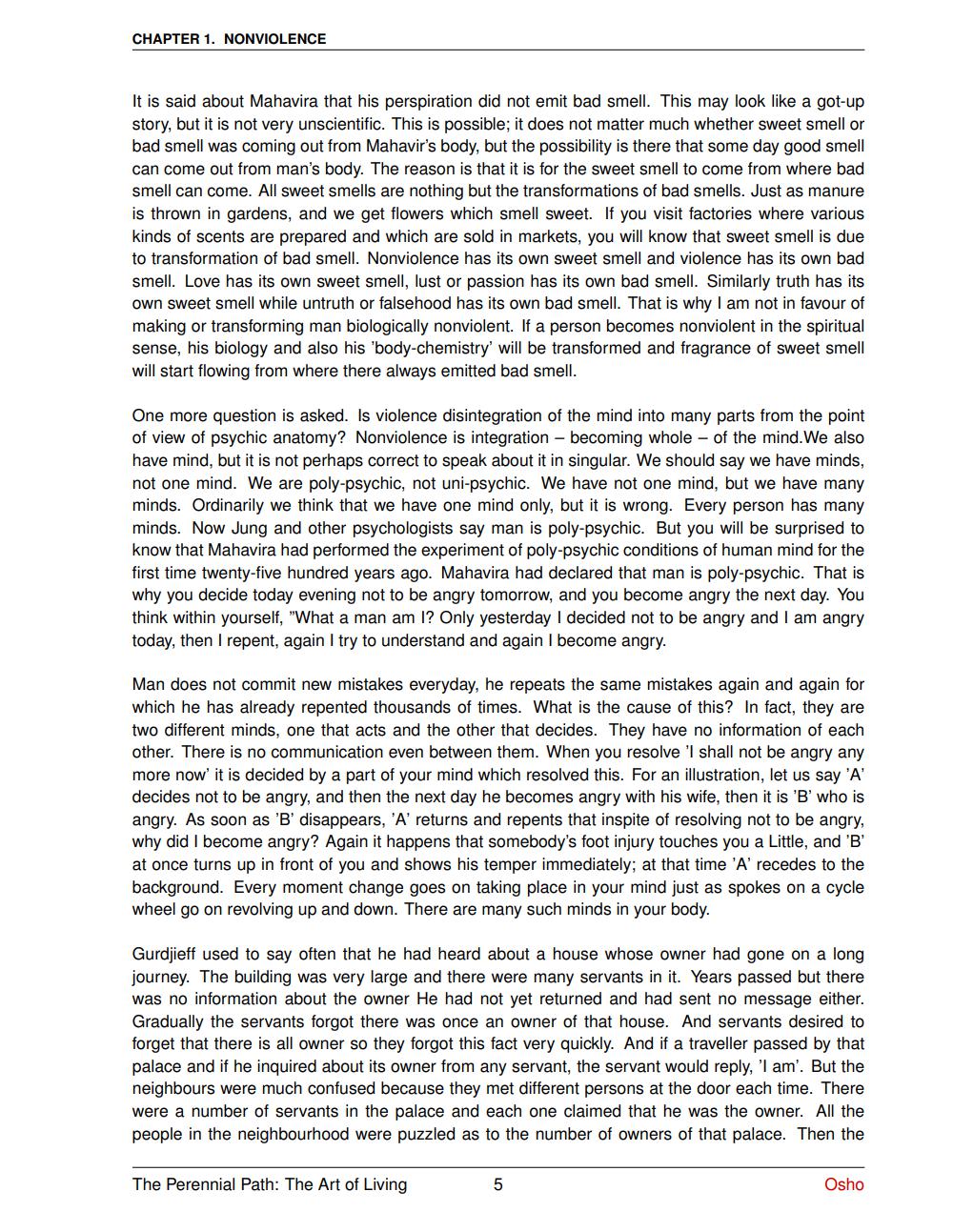Book Title: Panch Mahavrat or The Perennial Path The Art of Living Author(s): Osho Rajnish Publisher: Osho Rajnish View full book textPage 5
________________ CHAPTER 1. NONVIOLENCE It is said about Mahavira that his perspiration did not emit bad smell. This may look like a got-up story, but it is not very unscientific. This is possible; it does not matter much whether sweet smell or bad smell was coming out from Mahavir's body, but the possibility is there that some day good smell can come out from man's body. The reason is that it is for the sweet smell to come from where bad smell can come. All sweet smells are nothing but the transformations of bad smells. Just as manure is thrown in gardens, and we get flowers which smell sweet. If you visit factories where various kinds of scents are prepared and which are sold in markets, you will know that sweet smell is due to transformation of bad smell. Nonviolence has its own sweet smell and violence has its own bad smell. Love has its own sweet smell, lust or passion has its own bad smell. Similarly truth has its own sweet smell while untruth or falsehood has its own bad smell. That is why I am not in favour of making or transforming man biologically nonviolent. If a person becomes nonviolent in the spiritual sense, his biology and also his 'body-chemistry' will be transformed and fragrance of sweet smell will start flowing from where there always emitted bad smell. One more question is asked. Is violence disintegration of the mind into many parts from the point of view of psychic anatomy? Nonviolence is integration - becoming whole- of the mind. We also have mind, but it is not perhaps correct to speak about it in singular. We should say we have minds, not one mind. We are poly-psychic, not uni-psychic. We have not one mind, but we have many minds. Ordinarily we think that we have one mind only, but it is wrong. Every person has many minds. Now Jung and other psychologists say man is poly-psychic. But you will be surprised to know that Mahavira had performed the experiment of poly-psychic conditions of human mind for the first time twenty-five hundred years ago. Mahavira had declared that man is poly-psychic. That is why you decide today evening not to be angry tomorrow, and you become angry the next day. You think within yourself, "What a man am I? Only yesterday I decided not to be angry and I am angry today, then I repent, again I try to understand and again I become angry. Man does not commit new mistakes everyday, he repeats the same mistakes again and again for which he has already repented thousands of times. What is the cause of this? In fact, they are two different minds, one that acts and the other that decides. They have no information of each other. There is no communication even between them. When you resolve 'l shall not be angry any more now' it is decided by a part of your mind which resolved this. For an illustration, let us say 'A' decides not to be angry, and then the next day he becomes angry with his wife, then it is 'B' who is angry. As soon as 'B' disappears, 'A' returns and repents that inspite of resolving not to be angry, why did I become angry? Again it happens that somebody's foot injury touches you a Little, and 'B' at once turns up in front of you and shows his temper immediately; at that time 'A' recedes to the background. Every moment change goes on taking place in your mind just as spokes on a cycle wheel go on revolving up and down. There are many such minds in your body. Gurdjieff used to say often that he had heard about a house whose owner had gone on a long journey. The building was very large and there were many servants in it. Years passed but there was no information about the owner He had not yet returned and had sent no message either. Gradually the servants forgot there was once an owner of that house. And servants desired to forget that there is all owner so they forgot this fact very quickly. And if a traveller passed by that palace and if he inquired about its owner from any servant, the servant would reply, 'I am'. But the neighbours were much confused because they met different persons at the door each time. There were a number of servants in the palace and each one claimed that he was the owner. All the people in the neighbourhood were puzzled as to the number of owners of that palace. Then the The Perennial Path: The Art of Living 5 OshoPage Navigation
1 ... 3 4 5 6 7 8 9 10 11 12 13 14 15 16 17 18 19 20 21 22 23 24 25 26 27 28 29 30 31 32 33 34 35 36 37 38 39 40 41 42 43 44 45 46 47 48 49 50 51 52 ... 96
